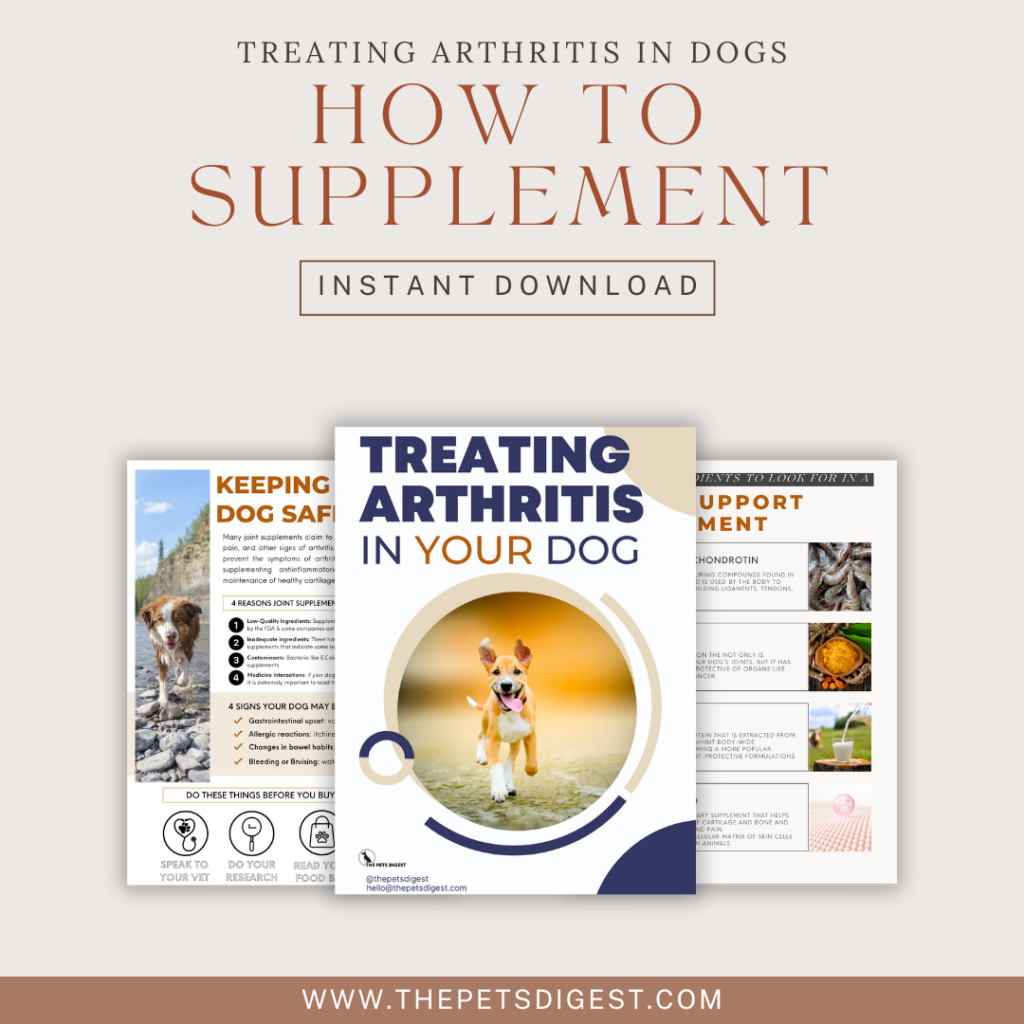What is the difference between diet supplements & nutraceuticals?
Dietary supplements and nutraceuticals are both used to augment your dog’s current diet and enhance their health.
- Dietary supplements are made from isolated nutrients of food, actual food, or food-like substances to enhance your dogs diet.
- Nutraceuticals are a sector of dietary supplements made only from whole foods.
How do joint supplements & nutraceuticals help dogs?
Many joint supplements claim to assist in relieving stiffness, pain, and other signs of arthritis. In addition, some aim to prevent the symptoms of arthritis in dogs altogether by supplementing antiinflammatories and supporting the maintenance of healthy cartilage and connective tissue.
Most aim to maintain good joint mobility in dogs through beneficial ingredients.
But all joint supplements for dogs are not equal which is why we took the time to research some of the best brands.
6 Things to look for in a good dog joint supplement or nutraceutical
1. Limited-Ingredient Formulations
Preferably, aim to purchase formulas that only have the most beneficial ingredients for your dog. This will cut back tremendously on any unnecessary additives. If possible limit the list to 10 ingredients or less.
By purchasing supplements that are formulated with minimal components you are also lowering the risk of introducing allergens into your dog’s system and reducing the chances of any allergic reactions or intolerances to the ingredients.
2. Minimum additives and artificial preservatives
While you do want some type of preservative in your dog’s treats as this will decrease the chances of the food spoiling quickly and reduce the chances of your dog becoming sick after eating a supplement. However, the preservatives should be minimal.
Also, watch for any unnecessary additives like synthetic flavors and dyes which are usually added to make the treats more appealing to humans and not pets.
3. High-quality ingredients
Of course, your best option is to choose a nutraceutical or supplement that uses high-quality (preferably whole) ingredients like fresh-caught fish, grass-fed beef, or organic veggies.
If a company adds these types of ingredients to its formulation it will most likely be listed somewhere on the packaging.
4. Money-back guarantees
While not necessary, if a product has a money-back guarantee it exhibits confidence in the product. While this may not always be the case it can give you added peace of mind.
Also, obviously, check any product reviews and testimonials. You can also check Consumer Reports to see if the supplement you chose has been tested
5. Scientifically Proven or tested labels
Many supplements that have been tested in a lab will place a statement on the label.
Since the FDA does not regulate many supplements or nutraceuticals this may give you confidence that what is on the ingredient list is truly in the product you are feeding your dog.
6. Reasonable claims
If a supplement makes far-fetched claims like completely curing your dog of arthritis or within a day you may want to bypass that supplement.
It may take some time to notice some improvement in your dog’s gait and most supplements don’t aim to cure your dog’s ailment just to improve their condition by alleviating pain and reducing some clinical signs.

10 Important Ingredients To Look For In A Joint Supplement For Dogs

Nutraceuticals
1. Glucosamine
Of course, glucosamine tops our list of ingredients you should seek to find in a beneficial joint supplement for dogs. It is a nutraceutical made in a lab or harvested from the shells of shellfish.
It is a natural compound found in your dog’s cartilage and is used by the body to help in the process of building ligaments, tendons, and joint fluid.
Glucosamine is one of the most researched nutraceuticals in the science of joint health and it has been shown to assist in alleviating some of the symptoms associated with arthritis in dogs.
2. Chondroitin Sulfate
Chondroitin is often used in conjunction with glucosamine as it is another nutraceutical that naturally occurs in the body. Like glucosamine, it is well-known for its proven chondroprotective effects on the body.
It is also a major component of your dog’s cartilage and is made synthetically or harvested from natural sources like shark or bovine cartilage.
There has been a lot of research done in both human and animal medicine to promote the use of chondroitin in promoting joint health in dogs.
However, there has been some evidence that glucosamine & chondroitin do not provide as much pain relief as once thought, more research is needed and underway. Here is one journal article that further establishes this theory (Source). It is necessary to note how each of these affects your dog on an individual basis to determine if they are truly helpful to your pup.
3. Curcumin
Often listed as turmeric on the label as curcumin is found in turmeric. Curcumin is a natural substance found in turmeric and is often used as an anti-inflammatory.
Not only is it helpful for your dog’s joints, but it has also been shown to be protective of organs like the heart and prevent cancer. This is why many owners find it beneficial to give the nutraceutical to their dogs on a regular basis and many joint supplements include it in their formulation.
To read about more health benefits of turmeric for dogs and how you can add it to your dog’s diet, read our article here: Turmeric for dogs: The benefits, the dangers, how to use it and an awesome recipe
4. Microlactin
Microlactin is a milk protein that is extracted from cow’s milk. It is said to inhibit body-wide inflammation.
While not one of the components of many joint-protective formulations for dogs microlactin is on the rise in several supplements.
Dietary Supplements
5. Hyaluronic Acid
Hyaluronic acid is a dietary supplement that helps aid in the development of cartilage and bone and reduces inflammation, and pain.
It is found in the extracellular matrix of skin cells and connective tissues in animals.
6. Omega 3 fatty acids
A good joint-support supplement will definitely include Omega 3 fatty acids as they are fairly well-researched in relieving joint pain. They have tremendous anti-inflammatory properties and may be listed as Omega 3 fatty acids or as fish oil.
Many newer supplements are using green-lipped mussels in their formulations as these are high in Omega 3 fatty acids. In fact, it was found that they are much more potent than the EPA found in fish oil.
At least in the short term, dietary supplementation with fish oil omega-3 fatty acids resulted in an improvement in weight bearing in dogs with osteoarthritis and has been shown to help stop cartilage degeneration. (Source)
7. Methylsulfonylmethane
Methylsulfonylmethane or MSM is a popular supplement found in many joint formulations for dogs. It is a naturally occurring compound found in meat, dairy products, and fresh veggies.
It is rich in sulfur which is necessary in the formation of healthy bones and joints and plays an important role in many of the body’s other processes.
The type of MSM found in supplements is usually synthetic.
8. Avocado Oil
While not in many formulas, avocado oil has been shown to reduce inflammation of cartilage damage and you may see some improvement in your dog’s gait or pain levels by using a supplement that includes avocado oil.
9. Cetyl Myristoleate
Cetyl Myristoleate is a supplement that has been shown to reduce pain and improve the range of motion in arthritis sufferers.
It is an ester or a compound of fatty acid commonly found in dairy products, fish oils, butter, and animal fat. If it is in your dog’s joint supplements it is most likely synthetic and not of animal origin.
It is not commonly found in many supplements as some previous research stated it was ineffective at relieving arthritis pain but new research has shown otherwise.
It acts similarly to the methods of Omega 3 fatty acids and has great anti-inflammatory powers.
10. Boswellia
Boswellia is an extract included in many supplements for dogs suffering from arthritis. It has been shown to reduce stiffness in the joints and subsequent pain due to arthritis. The extract should state that it is Boswellia extract and not Boswellia resin as it is not as potent.
Bonus
11. Vitamin E and C
Both vitamins have been shown to have anti-inflammatory and antioxidative effects, which is great for a dog suffering from arthritis.

Click here to see our top picks for joint supplements for dogs
Other Articles About Arthritis in Dogs
Resources
- FDA Regulation on Pet Food
- Use of supplements in dogs (link to the supplements used in this study)
- Evaluating the usefulness of joint supplements in dogs
- Glucosamine and chondroitin in dogs
- Efficacy of dietary supplements on arthritis in dogs
- https://www.ncbi.nlm.nih.gov/pmc/articles/PMC8658017/#:~:text=Glucosamine%20and%20Chondroitin,and%20chondroprotective%20effects%20%5B33%5D.

























































































































